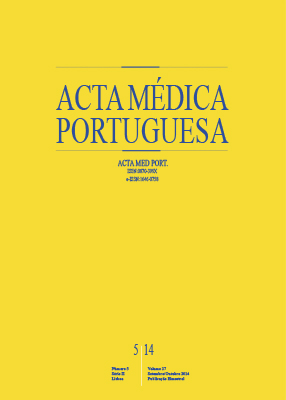Quality Assessment of Long-Term Prescription Records: QMP Study
DOI:
https://doi.org/10.20344/amp.5058Abstract
Introduction: The growing concern surrounding health safety issues makes it essential that everyone, in particular the elderly due to their commonly prescribed multiple drugs, has a complete and up to date list of prescriptions. We planned to assess the quality of the electronic records of prolonged medication.
Material and Methods: This is an observational, transversal and descriptive study, with an analytical component, in which we assessed the technical quality of prolonged medication records of elderly patients of four primary health care, before and after a guided intervention. The doctors received training in good practice recording methods and both professionals and patients were stimulated to use the prolonged medication guide.
Results: We evaluated 388 medical records of 33 physicians. The ideal category ‘Appropriated medication with posology’ improved from 23.5% to 48% (p < 0,001). The remaining categories ‘Inappropriated Medication’ and ‘Appropriated medication but absent posology’ decreased from 16.7% to 7% (p = 0,006) and from 59.8% to 46.0% (p = 0,02), respectively. The variables mentor’s training skills, workplace, length of family practice and the percentage of elderly in the physician’s list showed statistical significance differences at the beginning of the study which disappeared after the intervention, except for the latter.
Discussion: In this study, physicians accepted the proposed changes, regardless of age, gender, mentor’s training skills, workplace or length of family practice. Longer duration appointments in the eldery group may be an obstacle in achieving the best results.
Conclusion: This original study reveals the necessity to implement periodic postgraduate training to encourage physicians to keep medical records up to date.
Keywords: Long-term Care; Electronic Prescribing; Drug Prescriptions; Family Practice; Aged.
Downloads
Downloads
Published
How to Cite
Issue
Section
License
All the articles published in the AMP are open access and comply with the requirements of funding agencies or academic institutions. The AMP is governed by the terms of the Creative Commons ‘Attribution – Non-Commercial Use - (CC-BY-NC)’ license, regarding the use by third parties.
It is the author’s responsibility to obtain approval for the reproduction of figures, tables, etc. from other publications.
Upon acceptance of an article for publication, the authors will be asked to complete the ICMJE “Copyright Liability and Copyright Sharing Statement “(http://www.actamedicaportuguesa.com/info/AMP-NormasPublicacao.pdf) and the “Declaration of Potential Conflicts of Interest” (http:// www.icmje.org/conflicts-of-interest). An e-mail will be sent to the corresponding author to acknowledge receipt of the manuscript.
After publication, the authors are authorised to make their articles available in repositories of their institutions of origin, as long as they always mention where they were published and according to the Creative Commons license.









